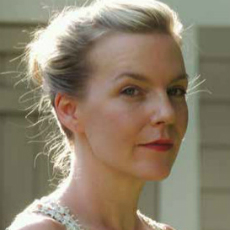Chicago author Leslie Parry is a graduate of the Iowa Writers’ Workshop. Her short stories have appeared in VQR, The Missouri Review, The Cincinnati Review, The PEN/O. Henry Prize Stories, and elsewhere. Church of Marvels is her first novel.
My son is one week old. The morning he was born, I held him, delirious, and gazed out at the bell towers of Pilsen, the trailing smokestacks, the eely flicker of distant trains. At night, in the quiet of the hospital, we listened to the L rumble past – the only sound from the outside world – a steady lullaby that soothed my son to sleep. My husband said proudly that our boy is a Hot Dog Baby, Chicago-born.
Me, I’m a stubborn Californian, a desert native, at home with the Santa Anas and Pacific tides, unused to the frigid coat of winter, the white chill that hung above the city. As I lay in the hospital bed, staring out at the shrouded skyline, I thought: how did I end up here? I was sure I would live my life out in Los Angeles – not because it was superior to Chicago, but because Chicago never seemed to belong to me. It was the storied land of my grandfather, the paper-shoed southpaw turned grinding-wheel magnate, a place I’d first become acquainted with through his delightful den of chintz: Cubs bobbleheads and penny souvenirs, steakhouse swizzle-sticks, a music box that played That Toddlin’ Town. For most of my life, Chicago was a fable told by a man in a sherbet-colored dinner jacket, a man who ate shrimp cocktail on his Astroturf porch while the neon of Hollywood glimmered below.
Those early hours with my son, I remembered that my grandfather had been born just a few miles away, at Erie and Cicero. He grew up in a string of apartments around Austin, one of eight children. His mother worked as a domestic, cleaning houses, bringing in piecemeal sewing and wash; his father, who liked to remind everyone he was descended from a line of noble French fur-trappers, drifted in and out, drank away the boys’ paper route money. The family was always, as my grandfather put it, “one step ahead of the sheriff.” Their account at the grocer’s was never paid; they fled their flint-eyed landlords. Meals of cold rice in milk; cardboard shoes that turned to pulp in the muddy alleyways; a makeshift bed on the kitchen table, shared with brothers, sisters, bedbugs. Growing up, Grandpa said, “I thought everybody was poor.” Two of his siblings died young; the rest stuck close together, handing over every cent to their mother. He worked as an errand boy after school, delivered newspapers in the mornings, pitched for neighborhood baseball teams. (His arm was so strong that once, on his route, he broke a picture window with a lobbed Tribune.) To make ends meet, he and his brother boiled hot dogs in a bucket and sold them outside Wrigley Field. He dreamed of one day hitchhiking to Florida for spring training tryouts, but the family needed his earnings. Wiry and underfed, he graduated high school at 98 pounds. They called him Midge.
By the time I was born Midge was a self-made man, a world traveler, a jolly raconteur. Wherever he went he made friends – with waiters and cabbies, bellhops and bus-drivers. Treat every person the same, he told me, whether it’s the company president or a machine shop worker. It doesn’t matter if you can’t be generous with money or fancy things. Give someone your ear, your shoulder, your compassion.
He left to make his fortune elsewhere, but he remained nostalgic for the place he was born. In saying goodbye, I understand now, he made sure the Hot Dog Baby would have a different kind of boyhood here. There will be Cubs games and lake swimming, frosted malts on summer days. For me, of course, Chicago is a charmed place – it’s the city where I fell in love; the city where I met my son. I used to wonder how my grandfather could remain so optimistic – how, without a hint of bitterness or cynicism, he could be fondest of the place where he’d struggled the most.
It’s because there are no bad days, he said to me. Some are just better than others.



Add a comment to: Guest Blog: Leslie Parry on Chicago: The City That Gives